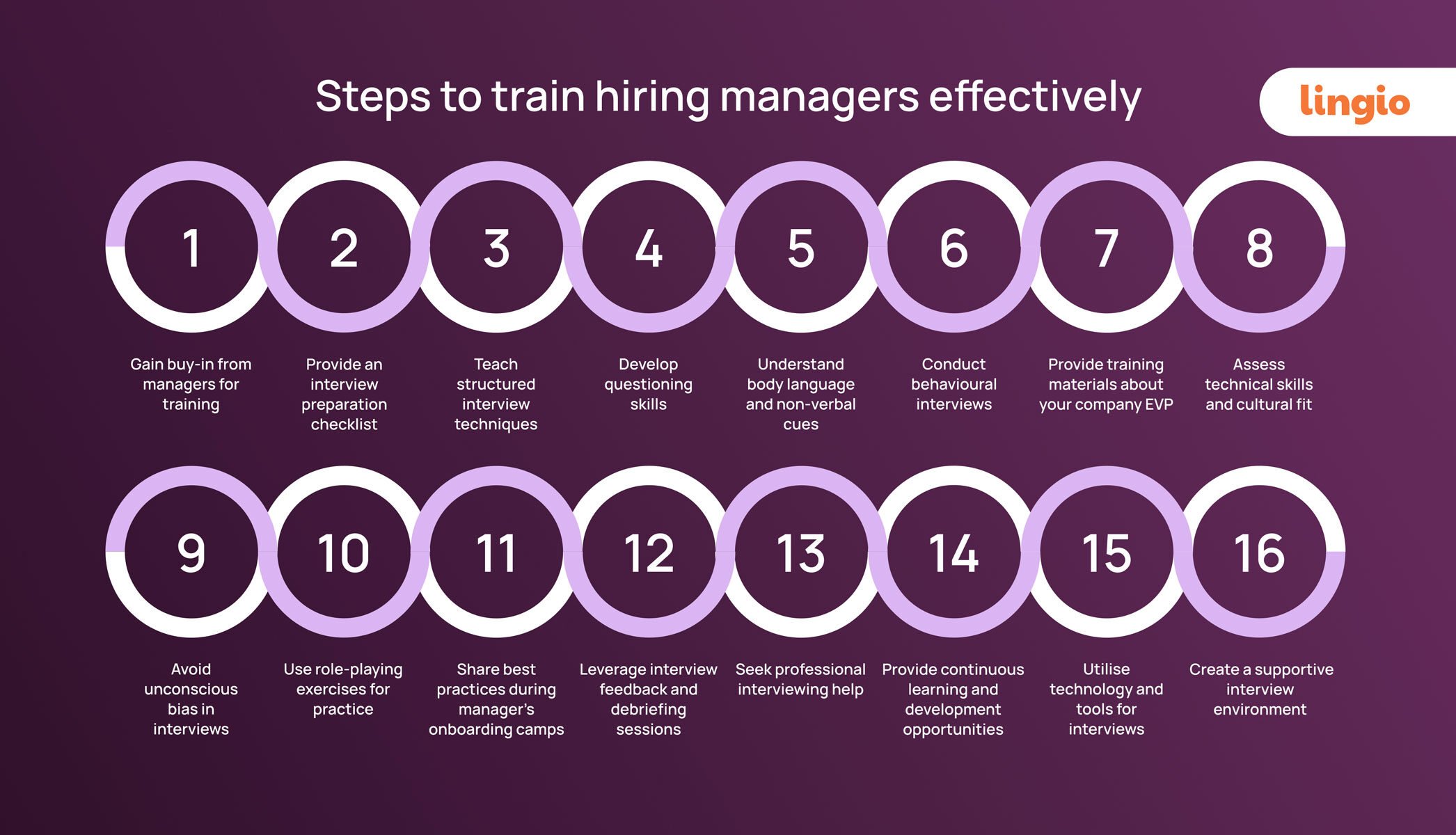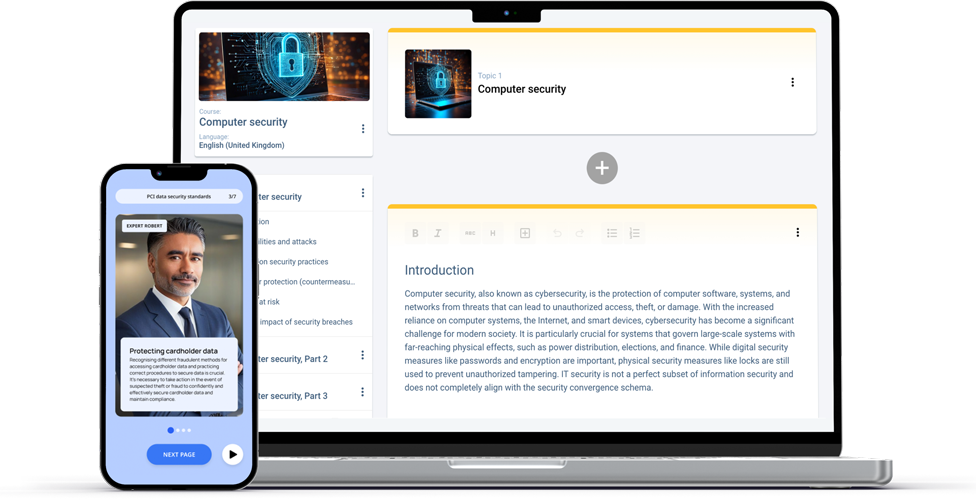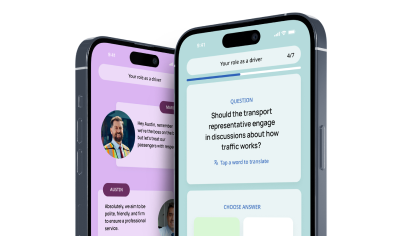16 steps to train hiring managers effectively

1. Gain buy-in from managers for training
Before diving into the training program, it's crucial to gain buy-in from hiring managers. Communicate the benefits of the interview training program and how it will enhance their interviewing skills. Address any concerns and ensure they understand that this training will improve their ability to identify and hire top talent.
Also, you can get some up-to-date statistics on the current topic to persuade managers of the importance of such training. For example, according to a study by LinkedIn, companies with solid training programs enjoy a 24% higher profit margin than those that spend less on training. Additionally, organisations with effective training programs have a 218% higher income per employee. Address managers' concerns and ensure they understand that this training will improve their ability to identify and hire top talent. Emphasising these statistics can help highlight the tangible benefits of investing in interviewer training.
2. Provide an interview preparation checklist
One of the first steps in training hiring managers is to provide them with an interview preparation checklist. This checklist will serve as a guide for conducting thorough interviews, ensuring that all necessary steps are taken. It should include pre-interview preparations, interview questions and candidate answers, evaluation criteria, and post-interview procedures.
Understand the role and requirements:
- Review the job description and key responsibilities
- Identify the essential skills and qualifications needed
- Familiarise yourself with the team and department
Prepare the interview structure for the hiring process:
- Decide on the format of the interview (e.g., one-on-one, panel)
- Plan the interview stages (e.g., initial screening, technical assessment)
- Allocate time for each stage of the interview
Develop a list of questions:
- Create a mix of open-ended, behavioural, and technical questions
- Ensure questions are aligned with the job requirements
- Prepare follow-up questions to probe deeper into responses
Review candidate resumes:
- Examine the candidate's resume and cover letter to be ready for the hiring process
- Note any areas to explore further during the interview
- Identify potential gaps or inconsistencies
Coordinate with other interviewers:
- Share the interview schedule and structure with other interviewers
- Assign specific topics or areas for each interviewer to cover
- Ensure all interviewers are aligned on the evaluation criteria
3. Teach structured interview techniques
Structured interviews involve hiring teams asking all candidates the same set of predetermined questions. This technique helps evaluate candidates objectively, as it ensures consistency and allows for fair comparisons. Train hiring managers on how to develop structured interview guides and how to use them effectively during interviews.
4. Develop questioning skills
An important aspect of interviewing is asking the right questions. Leaders often rely on generic or irrelevant questions that do not clearly understand a candidate's skills and abilities. Provide training on developing and asking practical questions that elicit meaningful responses, allowing associates in managerial roles to make informed hiring decisions.
5. Understand body language and non-verbal cues
Body language and non-verbal cues can provide valuable insights during an interview. By teaching hiring managers how to interpret and analyse these cues, they can better understand a candidate's level of confidence, engagement, and truthfulness. This training will enable interviewers to make more accurate assessments during interviews.
- Observe facial expressions: Pay attention to the candidate's facial expressions, such as smiles, frowns, or furrowed brows. These can indicate their comfort level, honesty, and reactions to questions.
- Monitor eye contact: Consistent eye contact can signify confidence and engagement, while avoiding eye contact may suggest discomfort or evasiveness. However, be mindful of cultural differences regarding eye contact.
- Notice posture: A candidate sitting upright and leaning slightly forward shows attentiveness and interest. Slouching or leaning back may indicate disinterest or lack of confidence.
- Watch hand movements: Gestures can emphasise a candidate's words, but excessive hand movements might suggest nervousness. Conversely, hands kept still or hidden may indicate discomfort.
- Evaluate mirroring: Candidates who mirror the interviewer’s body language often feel more connected and engaged. This unconscious mimicry can be a positive sign of rapport.
- Assess tone of voice: Pay attention to the candidate's tone, pitch, and pace of speech. A steady, calm tone suggests confidence, while a shaky or rushed tone may indicate nervousness.
- Identify inconsistencies: Look for discrepancies between verbal responses and non-verbal cues. If a candidate's words do not match their body language, it may indicate uncertainty or dishonesty.
- Observe microexpressions: These brief, involuntary facial expressions can reveal true emotions. Training managers to recognise microexpressions can provide deeper insights into a candidate's feelings.
- Note physical reactions: Watch for physical signs of nervousness, such as sweating, fidgeting, or blushing. While these can be normal, understanding them in context is essential.
- Create a comfortable environment: Ensure the interview setting is conducive to open communication, reducing candidate stress and making body language more natural and easier to interpret.
By incorporating these tips into their training, hiring managers can develop a keen eye for nonverbal cues, leading to more thorough and accurate assessments of job candidates during interviews.
6. Conduct behavioural interviews
Behavioural interviews focus on past behaviour as an indicator of future performance. Training hiring managers on how to conduct behavioural interviews will enable them to assess a candidate's skills, experiences, and competencies based on real-life examples. This type of interview can provide valuable insights into a candidate's ability to handle specific situations and challenges.
7. Provide training materials about your company EVP
Every organisation has its unique Employer Value Proposition (EVP), encompassing its mission, culture, and core values. Providing training materials about your company EVP will help hiring managers align their interviewing techniques with the organisation's overall goals. It ensures that potential hires possess the necessary skills and align with the company's values and culture.
8. Assess technical skills and cultural fit
Technical skills and cultural fit play a significant role in determining a new hire's success. Train hiring managers on how to assess both aspects during interviews effectively. This includes asking targeted questions, evaluating past experiences, and incorporating team-based assessments to gauge how well a candidate will fit within the existing team dynamics.
9. Avoid unconscious bias in interviews
Unconscious bias can cloud judgment and lead to unfair hiring decisions. Train hiring managers to know their unconscious biases and provide techniques to mitigate bias during interviews. This includes creating standardised evaluation criteria, focusing on job-related capabilities, and challenging assumptions or stereotypes.
10. Use role-playing exercises for practice
Role-playing exercises can be efficient in training hiring managers to develop interview questions. Hiring managers can practice their interviewing skills in a safe environment by simulating real interview scenarios. Encourage them to play the role of both interviewer and interviewee to gain a well-rounded understanding of the interview process.
11. Share best practices during manager's onboarding camps
Manager's onboarding camps provide an opportunity to share best practices and experiences. Encourage hiring managers to attend these camps where they can learn from seasoned professionals, share their own experiences, and gain valuable insights into effective interviewing techniques. Create a collaborative environment that fosters continuous learning and growth.
12. Leverage interview feedback and debriefing sessions
After each interview, facilitate debriefing sessions where the hiring manager can share their observations and insights. Encourage them to provide constructive feedback on candidates and evaluate their interviewing techniques. This helps in continuous improvement and fosters a culture of learning and development.
13. Seek professional interviewing help
Organisations may benefit from seeking help from a professional interview. External experts can provide specialised interview training, share industry best practices, and offer fresh perspectives on interviewing techniques. Consider bringing in professionals who can conduct workshops or provide one-on-one coaching sessions for hiring managers.
14. Provide continuous learning and development opportunities
Training hiring managers should not be a one-time event. Support their ongoing learning and development by providing resources such as books, webinars, or online courses. Encourage them to stay updated with the latest trends and techniques in hiring and interviewing. This continuous investment in their growth will ultimately benefit the organisation.
15. Utilise technology and tools for interviews
Technology has revolutionised various aspects of the recruitment process, including the interviewing stage. Explore different technologies and tools to enhance the interview experience for hiring managers and candidates. This may include video interviewing platforms, online assessment tools, or applicant tracking systems. Train hiring managers on effectively utilising these tools to streamline the interview process.
16. Create a supportive interview environment
Lastly, create a supportive interview environment for the hiring manager. Encourage open dialogue, provide resources and support when needed, and recognise their efforts in improving their interviewing skills. By fostering a positive and supportive culture, hiring managers will be more motivated to continuously enhance their interviewing skills and training techniques.
It is essential to understand that the interview process can be a nerve-wracking experience for both the interviewer and the interviewee. Therefore, creating a supportive environment is crucial to achieving the best possible outcomes. This can be achieved by offering training sessions and workshops to help the hiring manager develop their interviewing skills further. These sessions can cover a range of topics, from effective questioning techniques to active listening skills training, all aimed at improving the overall quality of the interview process.
Moreover, providing hiring managers with access to resources such as interview guides, sample questions, and feedback forms can significantly assist them in conducting successful interviews. These resources serve as valuable tools for preparing video interviews and help standardise the interview process across the organisation. By equipping hiring managers with the necessary support and resources, you are investing in their professional development and ensuring that the recruitment process is fair, consistent, and effective.





